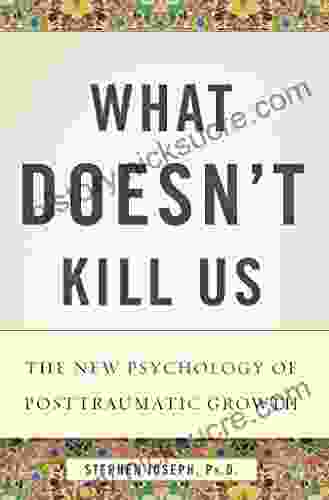Unlocking the Power of Posttraumatic Growth: A Transformative Journey of Healing and Resilience

:
In the realm of human experience, trauma casts a long shadow, leaving behind emotional scars and psychological wounds. Yet, within the depths of adversity, a remarkable phenomenon emerges—posttraumatic growth. This transformative process empowers individuals to transcend their traumatic experiences, emerging with enhanced resilience, profound wisdom, and a renewed appreciation for life.
Understanding Posttraumatic Growth:
Posttraumatic growth encompasses positive psychological changes that occur in response to significant life challenges or traumatic events. Contrary to the traditional view of trauma as solely a debilitating force, this phenomenon highlights the potential for personal growth and transformation in the wake of adversity.
4.6 out of 5
| Language | : | English |
| File size | : | 677 KB |
| Text-to-Speech | : | Enabled |
| Screen Reader | : | Supported |
| Enhanced typesetting | : | Enabled |
| Word Wise | : | Enabled |
| Print length | : | 290 pages |
Research has identified several key dimensions of posttraumatic growth:
- Positive Changes in Self-Perception: Individuals may develop a stronger sense of self-esteem, confidence, and resilience.
- Enhanced Appreciation for Life: Traumatic experiences can lead to a heightened gratitude for the present moment and a deeper value of life itself.
- Increased Spiritual Growth: Many individuals report a deepened connection to spirituality or a sense of purpose in the aftermath of trauma.
- New Opportunities: Trauma can sometimes lead to new avenues for personal and professional growth, such as career changes, or the pursuit of education.
- Close Relationships: Facing adversity can strengthen relationships with loved ones and create a sense of belonging and support.
Factors Influencing Posttraumatic Growth:
While posttraumatic growth is not a universal experience, several factors are believed to contribute to its development:
- Cognitive Processing: Individuals who engage in active processing of their traumatic experiences, seeking to understand and overcome the emotional impact, are more likely to experience growth.
- Social Support: Having a strong and supportive social network can provide a buffer against the negative effects of trauma and promote a sense of resilience.
- Personal Style: Individuals with certain personality traits, such as resilience and optimism, may be more prone to experiencing posttraumatic growth.
- Nature of the Traumatic Event: The severity, duration, and type of traumatic event can influence the potential for posttraumatic growth.
- Time and Context: Posttraumatic growth is a gradual process that may unfold over time and within specific cultural and societal contexts.
The Role of Therapy in Facilitating Posttraumatic Growth:
Therapy can play a vital role in supporting individuals through their posttraumatic growth journey. Therapists provide a safe and supportive environment where individuals can process their traumatic experiences, challenge negative beliefs, and develop coping mechanisms. Techniques such as cognitive-behavioral therapy, mindfulness, and trauma-focused therapies can help individuals move towards healing and fostering personal growth.
Implications for Personal Growth and Resilience:
The understanding of posttraumatic growth has significant implications for personal growth and resilience. By recognizing the potential for positive transformation, individuals can approach life's challenges with a mindset of empowerment and seek opportunities for learning and growth even in the face of adversity.
Promoting posttraumatic growth involves:
- Active Engagement: Seeking support, engaging in self-reflection, and challenging negative thoughts can foster posttraumatic growth.
- Cultivating Resilience: Building coping mechanisms, seeking out positive experiences, and developing healthy relationships can enhance resilience.
- Finding Meaning in Adversity: Identifying purpose and meaning in traumatic experiences can contribute to personal growth.
- Focusing on Strengths: Recognizing and capitalizing on personal strengths and resources can build self-confidence and empowerment.
- Embracing a Growth Mindset: Viewing challenges as opportunities for learning and growth can promote a positive outlook and foster resilience.
:
Posttraumatic growth is a transformative phenomenon that empowers individuals to transcend adversity and emerge with enhanced resilience, profound wisdom, and a renewed appreciation for life. By understanding the factors that contribute to this growth, and seeking support through therapy, individuals can navigate life's challenges with a mindset of empowerment and growth. Embracing the transformative power of posttraumatic growth unlocks a path towards healing, resilience, and a fulfilling life beyond the shadows of adversity.
4.6 out of 5
| Language | : | English |
| File size | : | 677 KB |
| Text-to-Speech | : | Enabled |
| Screen Reader | : | Supported |
| Enhanced typesetting | : | Enabled |
| Word Wise | : | Enabled |
| Print length | : | 290 pages |
Do you want to contribute by writing guest posts on this blog?
Please contact us and send us a resume of previous articles that you have written.
 Fiction
Fiction Non Fiction
Non Fiction Romance
Romance Mystery
Mystery Thriller
Thriller SciFi
SciFi Fantasy
Fantasy Horror
Horror Biography
Biography Selfhelp
Selfhelp Business
Business History
History Classics
Classics Poetry
Poetry Childrens
Childrens Young Adult
Young Adult Educational
Educational Cooking
Cooking Travel
Travel Lifestyle
Lifestyle Spirituality
Spirituality Health
Health Fitness
Fitness Technology
Technology Science
Science Arts
Arts Crafts
Crafts DIY
DIY Gardening
Gardening Petcare
Petcare Robert Solomon
Robert Solomon James Atkinson
James Atkinson Philip Gerard
Philip Gerard Kimberly Seals Allers
Kimberly Seals Allers Tashie Bhuiyan
Tashie Bhuiyan Stella Cottrell
Stella Cottrell William Murakami Brundage
William Murakami Brundage Ronald Mangravite
Ronald Mangravite Christopher Van Tilburg
Christopher Van Tilburg Donald Frias
Donald Frias Roberta M Gilbert
Roberta M Gilbert Sahara Foley
Sahara Foley Frank Close
Frank Close Mark Fisher
Mark Fisher Stuart Tyson Smith
Stuart Tyson Smith Laura Taylor Namey
Laura Taylor Namey Don Kirk
Don Kirk Steve Bo Keeley
Steve Bo Keeley Reynaldo S Galang
Reynaldo S Galang Maia Szalavitz
Maia Szalavitz Richard Sale
Richard Sale Helen Leigh
Helen Leigh Jessica Joelle Alexander
Jessica Joelle Alexander Karema Mcghee
Karema Mcghee Lessie Myles
Lessie Myles Jenny Moore
Jenny Moore Philip Mcmichael
Philip Mcmichael Samantha Michaels
Samantha Michaels Simon Singh
Simon Singh Mike Malaska
Mike Malaska 2nd Edition Kindle Edition
2nd Edition Kindle Edition Matt Appling
Matt Appling Emilio Iodice
Emilio Iodice Gregg Braden
Gregg Braden Nigel Foster
Nigel Foster Antony Cummins
Antony Cummins Carl Sagan
Carl Sagan Jonathan Robinson
Jonathan Robinson Iain Mcgilchrist
Iain Mcgilchrist Kristen Radtke
Kristen Radtke P J Capelotti
P J Capelotti Henry Bennett
Henry Bennett Marc Sedaka
Marc Sedaka Liz Wiseman
Liz Wiseman Jeff Mayers
Jeff Mayers John Derbyshire
John Derbyshire Kay Elder
Kay Elder Jennifer Comeaux
Jennifer Comeaux Shanaya Summer
Shanaya Summer Marie Tillman
Marie Tillman Tom Igoe
Tom Igoe Erik Molvar
Erik Molvar Leon Edward
Leon Edward Rebecca Schiller
Rebecca Schiller Prince Daniels Jr
Prince Daniels Jr Jody Houser
Jody Houser Tigran Bagdasaryan
Tigran Bagdasaryan Jessica Wapner
Jessica Wapner Joseph Distefano Iii
Joseph Distefano Iii Peter Newby
Peter Newby Thema Bryant Davis
Thema Bryant Davis Ji Kim
Ji Kim Joe Oswald
Joe Oswald Antoine Savine
Antoine Savine Tommy Nelson
Tommy Nelson J R Ward
J R Ward Anu Partanen
Anu Partanen Bart Yasso
Bart Yasso Joni L Mihura
Joni L Mihura Ruth Albee
Ruth Albee Jeremy Paxman
Jeremy Paxman Mario Batali
Mario Batali Dm Fitzgerald
Dm Fitzgerald Revised Edition Kindle Edition
Revised Edition Kindle Edition Tharik Hussain
Tharik Hussain Thomas Celentano
Thomas Celentano Victoria Duerstock
Victoria Duerstock Julyen Rose
Julyen Rose Jacqueline Melvin
Jacqueline Melvin Pat Brooks
Pat Brooks Sharon Begley
Sharon Begley Simon Pridmore
Simon Pridmore Bill Keenan
Bill Keenan Giovanni Amato
Giovanni Amato Ta Nehisi Coates
Ta Nehisi Coates Gigi Sayfan
Gigi Sayfan Linda Hibbs
Linda Hibbs Budd Bailey
Budd Bailey Bradford Angier
Bradford Angier Shannon O Gorman
Shannon O Gorman Antonio Diego
Antonio Diego Ton Viet Ta
Ton Viet Ta Martha Cheng
Martha Cheng Regan Parker
Regan Parker Mark Harper
Mark Harper John J Donohue
John J Donohue Michael J Hathaway
Michael J Hathaway Colleen Doyle Bryant
Colleen Doyle Bryant George J Sanchez
George J Sanchez Robert J Sweet
Robert J Sweet Chandelle Lavaun
Chandelle Lavaun Spanked Teen
Spanked Teen Sherry Blackman
Sherry Blackman Joshua Enyart
Joshua Enyart Martin Ganda
Martin Ganda Megan Whalen Turner
Megan Whalen Turner Supersummary
Supersummary Tracy Owens
Tracy Owens Abby Knox
Abby Knox Elisabeth Sheff
Elisabeth Sheff Jef Aldrich
Jef Aldrich H W Brands
H W Brands Grant Cunningham
Grant Cunningham Richard Eng
Richard Eng John N Maclean
John N Maclean Kevin Brunette
Kevin Brunette Susy Callory
Susy Callory Paula Hendricks
Paula Hendricks James L Swanson
James L Swanson Liz Lee Heinecke
Liz Lee Heinecke Ken Setterington
Ken Setterington Benoit Mandelbrot
Benoit Mandelbrot Todd Michael St Pierre
Todd Michael St Pierre Heather Turgeon
Heather Turgeon Robert B Stone
Robert B Stone Robert Clark
Robert Clark Jayne Storey
Jayne Storey Ian Freeman
Ian Freeman Sara Lyon
Sara Lyon Jane R Hirschmann
Jane R Hirschmann William Lanouette
William Lanouette Michael Tyler
Michael Tyler Hendrik Ebbers
Hendrik Ebbers Daniela Sacerdoti
Daniela Sacerdoti Ennki Hakari
Ennki Hakari James C Dobson
James C Dobson Fiore Tartaglia
Fiore Tartaglia Dianne Lake
Dianne Lake Second Edition Revised Kindle Edition
Second Edition Revised Kindle Edition Katharine A Phillips
Katharine A Phillips J Hannigan
J Hannigan Jackson Carter
Jackson Carter You Fuguruma
You Fuguruma Zac Williams
Zac Williams Herbert Warren Wind
Herbert Warren Wind Russell Elkins
Russell Elkins Grayson Sinclair
Grayson Sinclair Joe Kelsey
Joe Kelsey Erin Gruwell
Erin Gruwell Steven L Emanuel
Steven L Emanuel Tara Grayce
Tara Grayce Aquila Chrysaetos
Aquila Chrysaetos Sarah H Parcak
Sarah H Parcak Mamma Margaret
Mamma Margaret Michelle Quach
Michelle Quach Rebecca Stobaugh
Rebecca Stobaugh Louise Douglas
Louise Douglas Jean Anthelme Brillat Savarin
Jean Anthelme Brillat Savarin Doug Gelbert
Doug Gelbert Bernard Darwin
Bernard Darwin Eliana De Las Casas
Eliana De Las Casas Walter H Gmelch
Walter H Gmelch J T Burns
J T Burns Db King
Db King Dawn Hogue
Dawn Hogue Markus Zusak
Markus Zusak Chris Albon
Chris Albon Rick L Huffman
Rick L Huffman Michael Mccree
Michael Mccree Naoko Abe
Naoko Abe Harald E L Prins
Harald E L Prins Paul Ortiz
Paul Ortiz Katie Rain Hill
Katie Rain Hill Justi Carey
Justi Carey Michael Symon
Michael Symon Arous Brocken
Arous Brocken Kate Barrows
Kate Barrows Rael Isacowitz
Rael Isacowitz David J Anderson
David J Anderson Pedro Casal
Pedro Casal John Booss
John Booss Joy Jones
Joy Jones Richard Fortey
Richard Fortey James Cordrey
James Cordrey Jenny Hall
Jenny Hall Tim Collins
Tim Collins Gene Hamilton
Gene Hamilton Alessandra Belloni
Alessandra Belloni James Porzio
James Porzio Diana Raab
Diana Raab Ian Condry
Ian Condry Steve Sheward
Steve Sheward Jessie James Decker
Jessie James Decker Estelle Frankel
Estelle Frankel Hamish Haswell Smith
Hamish Haswell Smith David J Ley
David J Ley Daniel R Montello
Daniel R Montello Austin M Francis
Austin M Francis Corrine Morgan Thomas
Corrine Morgan Thomas Harry Vardon
Harry Vardon Theodore Kendris
Theodore Kendris Lawrence J Cohen Phd
Lawrence J Cohen Phd Jacki Pritchard
Jacki Pritchard Gary Morris
Gary Morris Dave Rineberg
Dave Rineberg June Goulding
June Goulding Jason Reynolds
Jason Reynolds Peter Ballin
Peter Ballin April Lara
April Lara Antony Felix
Antony Felix Donald B Deyoung
Donald B Deyoung Julie Tallard Johnson
Julie Tallard Johnson Melissa Wagner
Melissa Wagner Tina Nicastro Maom Lac
Tina Nicastro Maom Lac Craig Storti
Craig Storti Arrl Inc
Arrl Inc Charles C Patrick
Charles C Patrick Jerry R Thomas
Jerry R Thomas Cynthia Chen Mcternan
Cynthia Chen Mcternan Karen Newell
Karen Newell Ron Kittle
Ron Kittle Conn Iggulden
Conn Iggulden Chris Duff
Chris Duff Kindle Edition
Kindle Edition Shari Stauch
Shari Stauch Ariella Moon
Ariella Moon Lenyfer Garrido
Lenyfer Garrido Stephen Joseph
Stephen Joseph Joe Farinaccio
Joe Farinaccio Susan B Bastable
Susan B Bastable Claudia Sanborn
Claudia Sanborn Stephanie Mcmurrich Roberts Phd
Stephanie Mcmurrich Roberts Phd Stephanie Dalley
Stephanie Dalley Joseph F Healey
Joseph F Healey Roger Kahn
Roger Kahn Brett Friedman
Brett Friedman Andrew Miller
Andrew Miller Mark Kurlansky
Mark Kurlansky Sean Poage
Sean Poage Michael Morgan
Michael Morgan Denny Emerson
Denny Emerson Gary Jobson
Gary Jobson Cari Rosen
Cari Rosen Herbert L Gravitz
Herbert L Gravitz Tim Macwelch
Tim Macwelch Gina Ford
Gina Ford Jennifer M Bay Williams
Jennifer M Bay Williams Zigzag English
Zigzag English Archie Kalokerinos
Archie Kalokerinos Lou Paget
Lou Paget Justin Goldman
Justin Goldman Kevin Salwen
Kevin Salwen Richard Griffith
Richard Griffith Irfan Ahmad
Irfan Ahmad Craig Caudill
Craig Caudill Carrie Shuchart
Carrie Shuchart Ehren Myers
Ehren Myers Melissa Sperka
Melissa Sperka Dr Lucie Rivera
Dr Lucie Rivera Sarah Guthals
Sarah Guthals Gia Scott
Gia Scott Krysten Harlow
Krysten Harlow Robert Wright
Robert Wright Jenny B Jones
Jenny B Jones Amy R Carpenter
Amy R Carpenter Stephen Robson
Stephen Robson Thomas H Davenport
Thomas H Davenport David Klausmeyer
David Klausmeyer Miles Olson
Miles Olson John Vonhof
John Vonhof Charlie Meyers
Charlie Meyers Henrik Gert Larsen
Henrik Gert Larsen Leigh Cowart
Leigh Cowart Corey Wade
Corey Wade Karen Ehman
Karen Ehman Heather Renee
Heather Renee Marty Smith
Marty Smith Benny Lewis
Benny Lewis Virginia M Axline
Virginia M Axline Wyatt Mclaren
Wyatt Mclaren Lynn Marriott
Lynn Marriott Patricia Ottaviano
Patricia Ottaviano Carleen Eaton
Carleen Eaton Michael Wenz
Michael Wenz Aref Jeribi
Aref Jeribi Justin A Reynolds
Justin A Reynolds Dennis J Sweeney
Dennis J Sweeney Barbara Pachter
Barbara Pachter Daniel Bezman
Daniel Bezman The Pinnacle Review
The Pinnacle Review Sara Wheeler
Sara Wheeler Marco Stiantoni
Marco Stiantoni Carolyn Jessop
Carolyn Jessop Felicity Pulman
Felicity Pulman Peggy Mohan
Peggy Mohan Michelle Segar Phd
Michelle Segar Phd Anthony Idalion
Anthony Idalion Jason Brick
Jason Brick Sasha Issenberg
Sasha Issenberg Jen L Grey
Jen L Grey 1st Ed 2020 Edition Kindle Edition
1st Ed 2020 Edition Kindle Edition Julie Hall
Julie Hall Rick Riordan
Rick Riordan Steve Raible
Steve Raible Sherry Thomas
Sherry Thomas Jodi Lee
Jodi Lee Abbi Glines
Abbi Glines Barbara Brown Taylor
Barbara Brown Taylor Yassine Tounsi
Yassine Tounsi Dan Jones
Dan Jones Susie Johns
Susie Johns Jim Ross
Jim Ross Derek Dellinger
Derek Dellinger Eli Lizorkin Eyzenberg
Eli Lizorkin Eyzenberg Elton Moraes
Elton Moraes Greg Cruthers
Greg Cruthers Jennifer Karnopp
Jennifer Karnopp Richard Grant
Richard Grant Maya Angelou
Maya Angelou Winifred Conkling
Winifred Conkling Lindsay Powers
Lindsay Powers Torre Deroche
Torre Deroche Gary Paulsen
Gary Paulsen Randy Gerke
Randy Gerke Jason Hanson
Jason Hanson Bonnie Landry
Bonnie Landry Emma Frisch
Emma Frisch Robert J Sternberg
Robert J Sternberg Ernest Thompson Seton
Ernest Thompson Seton Julitta Korol
Julitta Korol Nystce Exam Secrets Test Prep Team
Nystce Exam Secrets Test Prep Team Mila Markle
Mila Markle Territory Supply
Territory Supply Marie Lu
Marie Lu Harvey Penick
Harvey Penick Jerzy Jezierski
Jerzy Jezierski Douglas Riley
Douglas Riley Charles C Pinter
Charles C Pinter Eric Coll
Eric Coll Chuck Carlson
Chuck Carlson Meg Meeker
Meg Meeker Colin Stroud
Colin Stroud Colleen Hoover
Colleen Hoover Jon Finkel
Jon Finkel Shavona L Floyd
Shavona L Floyd George Orwell
George Orwell Jessica Dixie Mills
Jessica Dixie Mills Alan Bass
Alan Bass R Scott Jones
R Scott Jones Dan Blanchard
Dan Blanchard My Daily Russian
My Daily Russian Cheng Liu
Cheng Liu Tom Wolfe
Tom Wolfe Brandon Royal
Brandon Royal Carolyn Henry
Carolyn Henry Chelsea Hanson
Chelsea Hanson Tasha Powers
Tasha Powers Harvey Berman
Harvey Berman Nancy Clark
Nancy Clark Tamim Ansary
Tamim Ansary Peggy A Houglum
Peggy A Houglum Cara Natterson
Cara Natterson Roger Guay
Roger Guay Lauren Kahl
Lauren Kahl Sonia Weyers
Sonia Weyers George Sandford
George Sandford Melyssa St Michael
Melyssa St Michael Louie Giglio
Louie Giglio Phil Genova
Phil Genova Stephen E Dew
Stephen E Dew Ken Adcock
Ken Adcock Austyn Lee
Austyn Lee George Kimball
George Kimball Paul D Ellis
Paul D Ellis Dan Michaelson
Dan Michaelson Erving Goffman
Erving Goffman Mira Ptacin
Mira Ptacin Kelly Jensen
Kelly Jensen John Miller
John Miller Philip Pullman
Philip Pullman Stephanie R Haynes
Stephanie R Haynes Jonathan Benson
Jonathan Benson Ogi Ogas
Ogi Ogas Panos Y Papalambros
Panos Y Papalambros Robbie Thompson
Robbie Thompson Proper Education Group
Proper Education Group Dr Mark Sircus
Dr Mark Sircus Lara Kolawole
Lara Kolawole Sally Huss
Sally Huss Joy Nash
Joy Nash Peter Nabokov
Peter Nabokov Anya Hayes
Anya Hayes Matthew M Hurley
Matthew M Hurley Tom Burns
Tom Burns Antonia Felix
Antonia Felix Jennifer Scribner
Jennifer Scribner Pharmacology University
Pharmacology University Laurence Gardner
Laurence Gardner Jordan Christy
Jordan Christy Joe Brooks
Joe Brooks David Robinson
David Robinson Craig L Farnsworth
Craig L Farnsworth Mark Broadie
Mark Broadie Marcia Nathai Balkissoon
Marcia Nathai Balkissoon Keiko Tobe
Keiko Tobe James Ori
James Ori Steve Pease
Steve Pease Michael Wisehart
Michael Wisehart Jean Beaman
Jean Beaman Mr Michael Quilty Maguire
Mr Michael Quilty Maguire Mark Woods
Mark Woods Mark Sundeen
Mark Sundeen Deborah Miller
Deborah Miller Peter Aitchison
Peter Aitchison Michael Walker
Michael Walker Michael A Cremo
Michael A Cremo Michelle Oberman
Michelle Oberman Sophie Gonzales
Sophie Gonzales Odessa Gillespie Black
Odessa Gillespie Black Paul Lockhart
Paul Lockhart Brian Morris
Brian Morris Mike Liner
Mike Liner Jim Gourley
Jim Gourley Philip C Plait
Philip C Plait Karen Gravelle
Karen Gravelle Philip S Harrington
Philip S Harrington Laura Stamm
Laura Stamm Eugene V Resnick
Eugene V Resnick J Robert King
J Robert King Inc Barcharts
Inc Barcharts David Warriner
David Warriner Jeff Galloway
Jeff Galloway Gaia Vince
Gaia Vince Chris Carmichael
Chris Carmichael Go Books
Go Books Christina Thompson
Christina Thompson Robin Horsfall
Robin Horsfall Richard A Horsley
Richard A Horsley Erfun Geula
Erfun Geula Antonia Bolingbroke Kent
Antonia Bolingbroke Kent Laurie Halse Anderson
Laurie Halse Anderson Mark Stavish
Mark Stavish Clara E Hill
Clara E Hill Geraldine Brooks
Geraldine Brooks Headquarters Department Army
Headquarters Department Army Julie Murphy
Julie Murphy Susan Campbell Bartoletti
Susan Campbell Bartoletti Marge Foley
Marge Foley Art Smith
Art Smith John S Mbiti
John S Mbiti Deirdre Dolan
Deirdre Dolan William Hanson
William Hanson Karl F Kuhn
Karl F Kuhn Creek Stewart
Creek Stewart John Snygg
John Snygg Kathleen Hale
Kathleen Hale Lj Andrews
Lj Andrews Michael Pearle
Michael Pearle Caroline Gallup
Caroline Gallup Shane Parrish
Shane Parrish Anya Kuvarzina
Anya Kuvarzina Paige Rawl
Paige Rawl Silvana Condemi
Silvana Condemi
Light bulbAdvertise smarter! Our strategic ad space ensures maximum exposure. Reserve your spot today!

 Calvin FisherHis Dark Materials: The Amber Spyglass: A Comprehensive Exploration of the...
Calvin FisherHis Dark Materials: The Amber Spyglass: A Comprehensive Exploration of the... Robert HeinleinFollow ·18.5k
Robert HeinleinFollow ·18.5k Douglas FosterFollow ·17.2k
Douglas FosterFollow ·17.2k Gabriel Garcia MarquezFollow ·8.9k
Gabriel Garcia MarquezFollow ·8.9k Cortez ReedFollow ·4.9k
Cortez ReedFollow ·4.9k Dwight BellFollow ·19.2k
Dwight BellFollow ·19.2k F. Scott FitzgeraldFollow ·4.9k
F. Scott FitzgeraldFollow ·4.9k Geoffrey BlairFollow ·11.3k
Geoffrey BlairFollow ·11.3k Fletcher MitchellFollow ·6.7k
Fletcher MitchellFollow ·6.7k

 Bernard Powell
Bernard PowellAn Elusive World Wonder Traced
For centuries, the...

 Samuel Ward
Samuel WardAce Your Motorcycle Permit Test: 300 Essential Questions...
Obtaining a...

 Boris Pasternak
Boris PasternakTips for Leveling Up Refinement: Doing it With Class
Refinement is a...

 Willie Blair
Willie BlairThe Spare Room: A Haven for Art and Creativity in London
The Spare Room is a unique and inspiring...

 Howard Blair
Howard BlairThe Run-Walk-Run Method: Your Gateway to Running Success
Unlock Your Inner Runner ...
4.6 out of 5
| Language | : | English |
| File size | : | 677 KB |
| Text-to-Speech | : | Enabled |
| Screen Reader | : | Supported |
| Enhanced typesetting | : | Enabled |
| Word Wise | : | Enabled |
| Print length | : | 290 pages |












